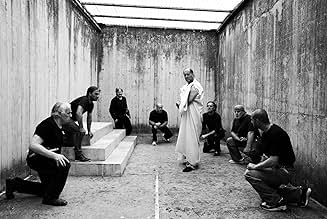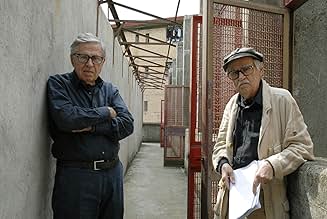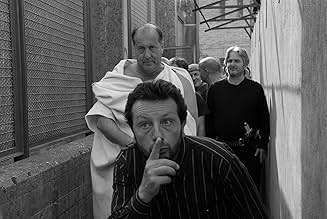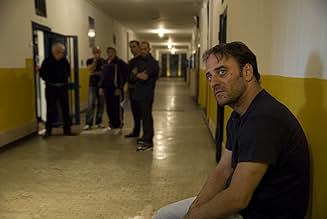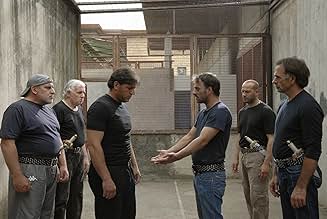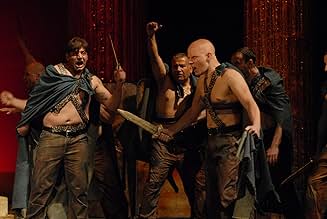IMDb-BEWERTUNG
7,3/10
6929
IHRE BEWERTUNG
Füge eine Handlung in deiner Sprache hinzuInmates at a high-security prison in Rome prepare for a public performance of Shakespeare's "Julius Caesar."Inmates at a high-security prison in Rome prepare for a public performance of Shakespeare's "Julius Caesar."Inmates at a high-security prison in Rome prepare for a public performance of Shakespeare's "Julius Caesar."
- Regie
- Drehbuch
- Hauptbesetzung
- Auszeichnungen
- 16 Gewinne & 21 Nominierungen insgesamt
Empfohlene Bewertungen
Six years on from The Lark Farm, Paolo and Vittorio Taviani found in stage productions of the Roman prison inmates Rebibbia energy and the urge to get back behind the camera and make a new film. They wrote and directed and produced within the Roman prison facility and with the same group of actors-prisoners.
Only apparently docudrama, but in reality almost entirely representation, Caesar must die tells the staging of "Julius Caesar" by Shakespeare, who are leaving very little overlap between the preparation of the play and the play itself, the express wish to amplify the most painful and intimate adhesion of the detainees to their characters and feelings they carry. The films of the Taviani can undoubtedly convey the strength and passion of surprising interpretations, and is able to find moments of clear staging with a charm that builds on the context, but transcends it. Unfortunately, however, is also weighed down by an idea of cinema out of date and time.
The intensity of black and white "Giulio Cesare" acted within the walls of prison, goes limp, in fact, when the Taviani brothers - who, caught between themselves and Bertold Brecht were unwilling or able to give up the script, or embrace moments of pure documentation - they feel heavy and intrusive outside their hand. When they try to break the scene with a background, however artificial and, therefore, artificial. The illusion of reality sought by directors does not take off then ever, and breaks the suspension of disbelief achieved in staging Shakespeare. Worse still surrounds the operation with a sort of condescending paternalism that file the roughness, the personalities, the possibilities.
Why show "faking" two prisoners who bicker "really", another unable to take part in the tests because they tried to interview, one imagines the arrival of women in the theater or another that says, reciting, that "by when he met the art cell has become a real prison, "is frankly disturbing and morally objectionable, because it becomes another cage that imprisons artistic protagonists.
Only apparently docudrama, but in reality almost entirely representation, Caesar must die tells the staging of "Julius Caesar" by Shakespeare, who are leaving very little overlap between the preparation of the play and the play itself, the express wish to amplify the most painful and intimate adhesion of the detainees to their characters and feelings they carry. The films of the Taviani can undoubtedly convey the strength and passion of surprising interpretations, and is able to find moments of clear staging with a charm that builds on the context, but transcends it. Unfortunately, however, is also weighed down by an idea of cinema out of date and time.
The intensity of black and white "Giulio Cesare" acted within the walls of prison, goes limp, in fact, when the Taviani brothers - who, caught between themselves and Bertold Brecht were unwilling or able to give up the script, or embrace moments of pure documentation - they feel heavy and intrusive outside their hand. When they try to break the scene with a background, however artificial and, therefore, artificial. The illusion of reality sought by directors does not take off then ever, and breaks the suspension of disbelief achieved in staging Shakespeare. Worse still surrounds the operation with a sort of condescending paternalism that file the roughness, the personalities, the possibilities.
Why show "faking" two prisoners who bicker "really", another unable to take part in the tests because they tried to interview, one imagines the arrival of women in the theater or another that says, reciting, that "by when he met the art cell has become a real prison, "is frankly disturbing and morally objectionable, because it becomes another cage that imprisons artistic protagonists.
A week has passed since I watched "Cesare deve morire" and I am still trying to decipher the multiple layers on which this film has worked in my mind. The brothers Taviani have directed a masterpiece of 76' which however is so dense in content that the time is waxing inside one's own memory.
The Tavianis are documenting the mis-en-scene of a Shakespeare piece inside a prison. Probably the most impressive element of "Cesare deve morire" is the performances of the inmate actors. The fact that the film is shot as a documentary in its natural setting spreads the film in two layers which are seamlessly weaved on each other. On the first level we see the prisoners who are passionately rehearsing the lines of their characters and on the second level we stand on front of Cesar, Brutus and Antonius discussing in the alleys of Rome. As in the case of Bergman, the brothers Taviani are very successfully studying the relationship between theater and cinema.
This prison setting is extremely symbolic and renders the actor performances utterly intense. It feels as if the prisoners, lacking their physical freedom, are getting deep into the skin of those new personas seeking the experiences which prison has deprived them of. The performances are so convincing that one has to contemplate on the nature of human destiny. Could it be that one's social condition or even coincidences could make the same persons capable of the best and of the worst? Moreover, the film leads to an unavoidable rumination of the concept of freedom in all its forms.
A stark black and white photography pronounces the prison architecture and recreates ancient Rome in its bare corridors. The photography is perfectly self-standing and it would be of great artistic value even in the absence of a plot. The black and white may emphasize the lack of freedom of the inmates but also allows the spectator to ignore redundant information and to concentrate on the performances of the actors. It is remarkable how architectural beauty arises even in a prison. The common spaces are illustrated exceptionally well and after a while one feels lost in a limbo between the prison and Rome.
Finally, although the audience reaches catharsis after the end of Shakespeare's narration the narration of brothers Taviani remains unresolved into ones psyche. I personally believe that "Cesare deve morire" is one of those rare cinematic experiences that are capable to shake away well entrenched beliefs. That alone would make the film worth seeing. Gladly, those 76' are so much more.
The Tavianis are documenting the mis-en-scene of a Shakespeare piece inside a prison. Probably the most impressive element of "Cesare deve morire" is the performances of the inmate actors. The fact that the film is shot as a documentary in its natural setting spreads the film in two layers which are seamlessly weaved on each other. On the first level we see the prisoners who are passionately rehearsing the lines of their characters and on the second level we stand on front of Cesar, Brutus and Antonius discussing in the alleys of Rome. As in the case of Bergman, the brothers Taviani are very successfully studying the relationship between theater and cinema.
This prison setting is extremely symbolic and renders the actor performances utterly intense. It feels as if the prisoners, lacking their physical freedom, are getting deep into the skin of those new personas seeking the experiences which prison has deprived them of. The performances are so convincing that one has to contemplate on the nature of human destiny. Could it be that one's social condition or even coincidences could make the same persons capable of the best and of the worst? Moreover, the film leads to an unavoidable rumination of the concept of freedom in all its forms.
A stark black and white photography pronounces the prison architecture and recreates ancient Rome in its bare corridors. The photography is perfectly self-standing and it would be of great artistic value even in the absence of a plot. The black and white may emphasize the lack of freedom of the inmates but also allows the spectator to ignore redundant information and to concentrate on the performances of the actors. It is remarkable how architectural beauty arises even in a prison. The common spaces are illustrated exceptionally well and after a while one feels lost in a limbo between the prison and Rome.
Finally, although the audience reaches catharsis after the end of Shakespeare's narration the narration of brothers Taviani remains unresolved into ones psyche. I personally believe that "Cesare deve morire" is one of those rare cinematic experiences that are capable to shake away well entrenched beliefs. That alone would make the film worth seeing. Gladly, those 76' are so much more.
After attending the premiere of "Cesare Deve Morire", I was not so sure about the movie. It was a good movie, but somehow essayist, rather loose, not catchy. The outstanding performance of Salvatore Striano (Brutus) was striking and rewarded by the audience. The beautiful composition of black and white pictures was of high aesthetic value. It is a very calm movie, the music is nearly minimalistic.
So how come it had a huge impact on me - later? In contrast to most other movies I had seen in Berlin, it was important. Other movies dealt with existentialistic, superficially more important topics than with some prisoners rehearsing a Shakespeare play. Yet "Cesare Deve Morire" had more to say and thus it deserved the Golden Bear. The questions it poses are the same ones as in the Shakespeare play in interrelation with the real destiny of the imprisoned play actors. Even though it is not a particularly spectacular movie, it has the tenor of what makes a strong movie: Importance. The filmmaking is of minor importance, the idea is in the foreground, which is the right decision. The play continues in our minds after the final curtain. Impressive.
So how come it had a huge impact on me - later? In contrast to most other movies I had seen in Berlin, it was important. Other movies dealt with existentialistic, superficially more important topics than with some prisoners rehearsing a Shakespeare play. Yet "Cesare Deve Morire" had more to say and thus it deserved the Golden Bear. The questions it poses are the same ones as in the Shakespeare play in interrelation with the real destiny of the imprisoned play actors. Even though it is not a particularly spectacular movie, it has the tenor of what makes a strong movie: Importance. The filmmaking is of minor importance, the idea is in the foreground, which is the right decision. The play continues in our minds after the final curtain. Impressive.
10ibarradj
I saw this at the Palm Springs Film Festival and was blown away! As soon as the movie began, I could tell it was a movie that I should pay attention.
The plot is a performance of Shakespeare's Julius Caesar by a group of real-life prisoners in an Italian prison. I loved how the prisoners could relate to the play by seeing the parallels in their own lives--the power lust, deceit and betrayal. The more the prisoners understood the play, the more they became immersed in their roles.
There have been many attempts to make Shakespeare palatable to the modern audience. This was my favorite iteration because it showed the actors trying to understand it, just as an audience might try to find the relevance. As a high school student, I found Shakespeare and Roman History boring. It wasn't until I hit my 40s did I realize this history was more violent than the Sopranos.
I don't know if this movie has ever been widely released. I highly recommend seeing it if it ever comes to your town.
The plot is a performance of Shakespeare's Julius Caesar by a group of real-life prisoners in an Italian prison. I loved how the prisoners could relate to the play by seeing the parallels in their own lives--the power lust, deceit and betrayal. The more the prisoners understood the play, the more they became immersed in their roles.
There have been many attempts to make Shakespeare palatable to the modern audience. This was my favorite iteration because it showed the actors trying to understand it, just as an audience might try to find the relevance. As a high school student, I found Shakespeare and Roman History boring. It wasn't until I hit my 40s did I realize this history was more violent than the Sopranos.
I don't know if this movie has ever been widely released. I highly recommend seeing it if it ever comes to your town.
Perhaps its the beautiful rolling sound of the Italian dialogue telling the story of Julius Cesar that made this enjoyable at least to the auditory sense. Perhaps it was that the language was sometimes amended to be more modern and meaningful. Perhaps it was the explained parallels of some of the prisoners experiences that helped to make the context more understandable. No matter, it was a thoroughly great way to start the Sydney Film Festival. The fact that this was a script within a script set in a prison using some real life prisoners didn't detract from anything in this film for me - I go to the cinema generally looking for a story, a fabrication, an unreality dressed in reality. I liked the gritty black and white, the sub-line of the prison life and setting. Yes, perhaps a prisoner saying he now felt caged etc didn't have to be said because it was obvious, but all in all a very enjoyable watch. I was engaged and participating from beginning to end. For me, one of the better versions of Julius/Shakespeare and a nice twist on an old but everlasting story.
WUSSTEST DU SCHON:
- WissenswertesPaolo and Vittorio Taviani heard about the prisoners acting program and contacted Fabio Cavalli with the idea of doing Shakespeare's play and shot the whole experience.
- VerbindungenFeatured in Film '72: Folge vom 27. Februar 2013 (2013)
Top-Auswahl
Melde dich zum Bewerten an und greife auf die Watchlist für personalisierte Empfehlungen zu.
- How long is Caesar Must Die?Powered by Alexa
Details
- Erscheinungsdatum
- Herkunftsland
- Offizielle Standorte
- Sprache
- Auch bekannt als
- Cesare deve morire
- Drehorte
- Produktionsfirmen
- Weitere beteiligte Unternehmen bei IMDbPro anzeigen
Box Office
- Bruttoertrag in den USA und Kanada
- 76.908 $
- Weltweiter Bruttoertrag
- 1.567.339 $
- Laufzeit1 Stunde 17 Minuten
- Farbe
- Sound-Mix
- Seitenverhältnis
- 1.85 : 1
Zu dieser Seite beitragen
Bearbeitung vorschlagen oder fehlenden Inhalt hinzufügen

Oberste Lücke
By what name was Cäsar muss sterben (2012) officially released in India in English?
Antwort

